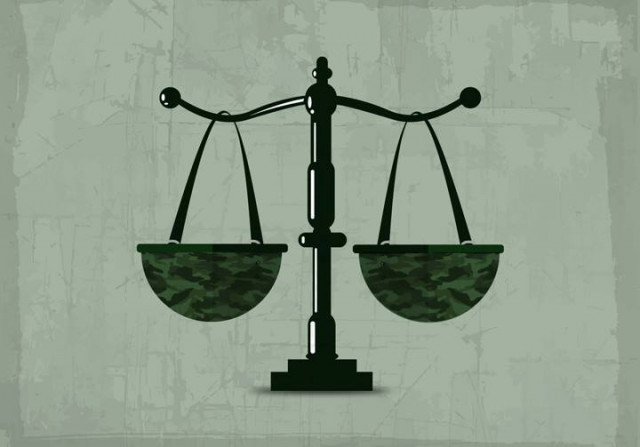Civilian laws not applicable in military courts: SC
The Supreme Court declared on Wednesday that civilian laws are not applicable in military courts

CREATIVE: AAMIR KHAN
The court also held that provisions of the Criminal Procedure Code (CrPC) would not be relevant in a case involving an offence dealt by the Field General Court Martial under the Army Act of 1952.
The three-judge bench of the court, headed by Justice Amir Hani Muslim, rejected the review petition, seeking acquittal of three persons, who were awarded death sentence by military courts.
Supreme Court Bar Association opposes extension of military courts
Counsel for applicants Col (retd) Muhammad Akram submitted that in view of the compromise between the legal heirs of the deceased and the petitioner, the petitioner could be acquitted. His main assertion was that in view of Section 1(2) of the CrPC, its provisions were applicable to the case in hand; hence compromise under Section 345(2) CrPC could be accepted. Justice Mazhar Alam Khan Miankhel, who wrote the six-page judgment, observed that provisions of the CrPC did not apply to matters governed by any special or local law unless specifically provided in those laws.
“If a person, who was proceeded against under a special law, he would be dealt with according to the procedure of enquiry/investigation and trial as laid down in the said Special Law.”
The court also observed that provisions of Section 143 of the Army Act showed that the Federal Government or the Chief of Army Staff or any officer not below the rank of Brigadier was empowered in this behalf by the Chief of Army Staff, who is empowered to grant such pardons, remissions and suspensions.
“In view of this very specific provision of the Army Act and being a Special Law, in our view, this court cannot assume such jurisdiction and that too in its review jurisdiction.”
The court also clarified that there was no bar of jurisdiction if the same suffered from mala fide, jurisdictional error or ‘corum non judice’.
Similarly, there was no prohibition on the high court to make an order under Article 199(3) of the Constitution if acts, actions or proceedings suffered from defect of jurisdiction or ‘coram non judice’.
The court also observed that if an action of the army authorities regarding a serving officer of the armed forces or any other person subject to the army act was established to be either mala fide, ‘corum non judice’ or without jurisdiction, then the same could be assailed through a constitutional petition by such aggrieved person and the bar of jurisdiction under Article 199(3) of the Constitution would not apply.
Parliamentary leaders agree to re-establish military courts for two years
The judgment stated that provisions of the CrPC would not apply to a case involving an offence dealt by the Field General Court Martial under the Army Act.
The court was also apprised by the DAG that because these petitions were pending, the JAG Branch of the army has already initiated the proceedings pertaining to compromise in these cases with the authorities concerned and the court was informed that death sentences of the present petitioners were converted to life imprisonments.
The petitioners in both the review petitions as well as the applicant in CMA were tried, convicted and sentenced to death by the Field General Court Martial under the Pakistan Army Act of 1952 (in short the ‘Army Act’).
Published in The Express Tribune, March 16th, 2017.



















COMMENTS
Comments are moderated and generally will be posted if they are on-topic and not abusive.
For more information, please see our Comments FAQ